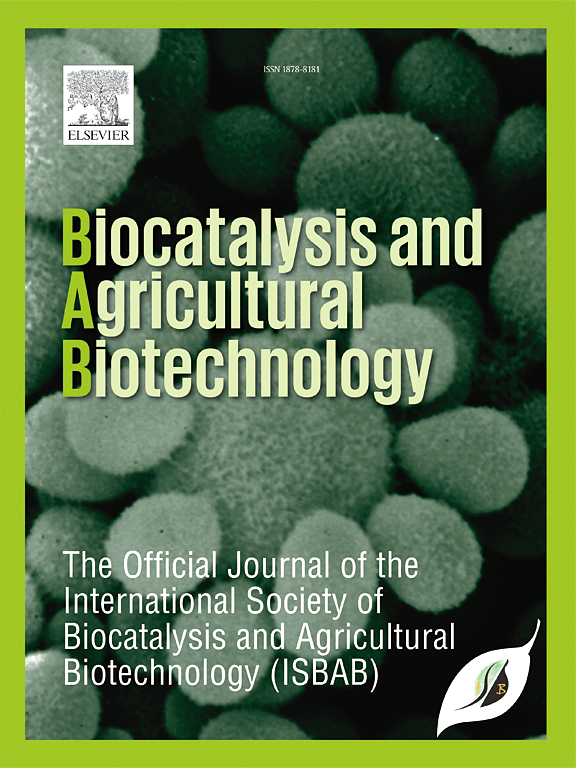Lysinibacillus fusiformis LF-E2 as a plant growth-promoting bioinoculant for improved rice growth
IF 3.8
Q2 BIOTECHNOLOGY & APPLIED MICROBIOLOGY
引用次数: 0
Abstract
Plant growth-promoting bacteria (PGPB) are crucial for sustainable agriculture, but their effectiveness varies between endophytic and rhizosphere bacteria due to differing ecological and climatic conditions. This study investigated the PGP potential of two bacterial strains, Bacillus subtilis (BS-R) and Lysinibacillus fusiformis (LF-E), as a bioinoculant to promote biocatalytic processes in rice cultivation, isolated from the rhizosphere and endophytic niches of traditional red rice (Sivappu Kavuni), on the widely cultivated rice variety TN1 (Oryza sativa L.) to elucidate their mode of action. In vitro analyses revealed that both strains demonstrated promising PGP traits, including the synthesis of indole-3-acetic acid (IAA), phosphate solubilization, siderophore production, 1-aminocyclopropane-1-carboxylate (ACC) deaminase activity, and hydrogen cyanide (HCN) production. Seed priming with these bacterial strains significantly enhanced seed germination and growth parameters. Among the treatments, Lysinibacillus fusiformis LF-E2 outperformed the control and BS-R strains. LF-E2 promoted early germination (within 23 h), improved seed vigor (1764), increased plant height (47.38 cm), and enhanced root (17.72 cm) and shoot (29.66 cm) lengths. Additionally, LF-E2 increased biomass and yield traits, such as a higher tiller number (64.6), panicles (19), grains per panicle (165), and grain weight (32.602 g per 1000 grains). LF-E2 also elevated levels of total soluble proteins (TSP, 2.334 mg/g FW), total phenolic content (TPC, 27.402 mg/g DW), and chlorophyll (5.6432 mg/g FW) in rice leaves. These findings highlight the potential of LF-E2, as a bioinoculant, improving rice growth and productivity, and offering a sustainable approach to enhancing agricultural outcomes.
梭状芽胞杆菌LF-E2作为植物生长促进剂改善水稻生长
植物促生长细菌(PGPB)对可持续农业至关重要,但由于生态和气候条件的不同,其有效性在内生细菌和根际细菌之间存在差异。本研究从传统红稻(Sivappu Kavuni)的根际和内生生态位中分离出枯草芽孢杆菌(Bacillus subtilis, BS-R)和梭状芽胞杆菌(Lysinibacillus fususiformis, LF-E)两株作为促进水稻栽培生物催化过程的菌剂,研究了它们对广泛栽培的水稻品种TN1 (Oryza sativa L.)的PGP潜力,以阐明它们的作用模式。体外分析表明,两株菌株均表现出良好的PGP性状,包括吲哚-3-乙酸(IAA)合成、磷酸盐增溶、铁载体生成、1-氨基环丙烷-1-羧酸(ACC)脱氨酶活性和氰化氢(HCN)生成。这些菌株对种子的萌发和生长参数有显著的促进作用。其中,梭状芽胞杆菌LF-E2的抑菌效果优于对照和BS-R。LF-E2促进了早期萌发(23 h内),提高了种子活力(1764),提高了株高(47.38 cm),增加了根长(17.72 cm)和茎长(29.66 cm)。此外,LF-E2增加了生物量和产量性状,如分蘖数(64.6)、穗数(19)、每穗粒数(165)和粒重(每1000粒32.602 g)。LF-E2还提高了水稻叶片中总可溶性蛋白(TSP, 2.334 mg/g FW)、总酚含量(TPC, 27.402 mg/g DW)和叶绿素(5.6432 mg/g FW)的含量。这些发现突出了LF-E2作为一种生物接种剂在改善水稻生长和生产力方面的潜力,并为提高农业成果提供了一种可持续的方法。
本文章由计算机程序翻译,如有差异,请以英文原文为准。
求助全文
约1分钟内获得全文
求助全文
来源期刊

Biocatalysis and agricultural biotechnology
Agricultural and Biological Sciences-Agronomy and Crop Science
CiteScore
7.70
自引率
2.50%
发文量
308
审稿时长
48 days
期刊介绍:
Biocatalysis and Agricultural Biotechnology is the official journal of the International Society of Biocatalysis and Agricultural Biotechnology (ISBAB). The journal publishes high quality articles especially in the science and technology of biocatalysis, bioprocesses, agricultural biotechnology, biomedical biotechnology, and, if appropriate, from other related areas of biotechnology. The journal will publish peer-reviewed basic and applied research papers, authoritative reviews, and feature articles. The scope of the journal encompasses the research, industrial, and commercial aspects of biotechnology, including the areas of: biocatalysis; bioprocesses; food and agriculture; genetic engineering; molecular biology; healthcare and pharmaceuticals; biofuels; genomics; nanotechnology; environment and biodiversity; and bioremediation.
 求助内容:
求助内容: 应助结果提醒方式:
应助结果提醒方式:


